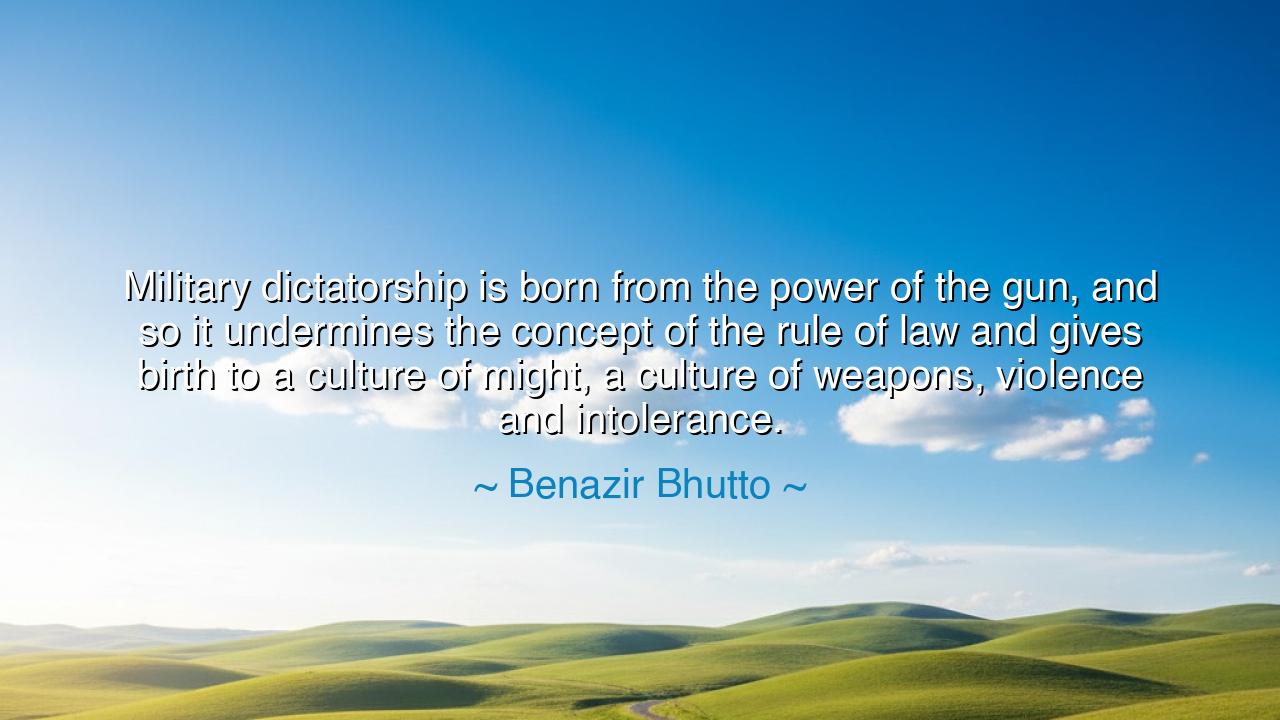
Military dictatorship is born from the power of the gun, and so
Military dictatorship is born from the power of the gun, and so it undermines the concept of the rule of law and gives birth to a culture of might, a culture of weapons, violence and intolerance.






In these solemn and piercing words, Benazir Bhutto warns of the destructive nature of military dictatorship, emphasizing that it is born not from justice or consent, but from the power of the gun. She observes that when authority is enforced through weapons, the rule of law is subverted, and society becomes captive to the whims of force rather than the principles of justice. In such a realm, power is measured not by wisdom or fairness, but by might, giving rise to a culture of violence, intolerance, and coercion that corrodes the soul of a nation. Bhutto’s insight is both a warning and a moral lesson: governance built on fear rather than law is inherently unstable and morally corrosive.
The origin of this insight lies in Bhutto’s own life and experience in Pakistan, a nation repeatedly caught between democratic aspiration and military rule. Having witnessed coups and the suppression of civil liberties, she understood that military authority, while capable of imposing order, can never foster justice, equality, or lasting legitimacy. Bhutto’s words echo the timeless wisdom of philosophers and political thinkers: from Aristotle to Montesquieu, the idea that governance must rest on law, not violence, has been a foundation for freedom and stability across civilizations.
History offers vivid examples of this principle in action. Consider Augusto Pinochet’s Chile, where military control replaced democratic institutions. Though the regime imposed order, it also cultivated fear, suppressed dissent, and normalized violence and intolerance. Laws became instruments of power rather than justice, illustrating Bhutto’s warning that a government born of guns inevitably erodes the foundations of civil society. The experience of Chile serves as a cautionary tale for all nations, emphasizing that legitimacy and moral authority cannot spring from force alone.
Bhutto’s reflection also underscores the ethical dimension of leadership. True governance requires restraint, fairness, and respect for the rights of all citizens. Military dictatorships, by contrast, foster a culture in which might dictates right, and human dignity is subordinated to coercion. The prevalence of weapons and violence, Bhutto warns, distorts values, engenders intolerance, and perpetuates cycles of fear and oppression. Societies cannot flourish under rule imposed by force alone; law, accountability, and moral authority must guide human affairs.
Ultimately, this quote is a meditation on justice, morality, and the foundations of society. Bhutto teaches future generations that enduring governance is rooted in law, consent, and the ethical exercise of authority—not in guns, violence, or intimidation. Let this wisdom endure: the power of the gun may impose obedience, but it can never create legitimacy; the true strength of a civilization lies in its commitment to justice, compassion, and the rule of law. Only by honoring these principles can society resist the corrosive culture of violence that follows in the wake of dictatorship.






AAdministratorAdministrator
Welcome, honored guests. Please leave a comment, we will respond soon